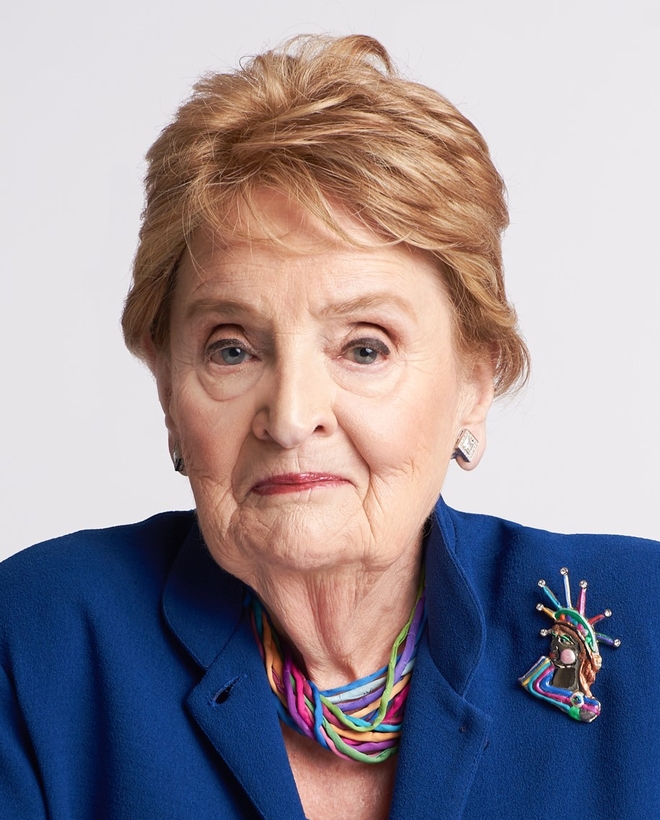Madeleine K. Albright


Madeleine K. Albright
Scholar. Stateswoman. Stalwart voice of democracy. Coming to America as a child, she embodied the American dream, breaking barriers in her political career and promoting human rights for all. With strategic policies and her statement pins, she guided peacekeeping efforts around the globe with courage, conviction, and flair. In gratitude for her public service and admiration for her leadership, Yale is pleased to confer posthumously this Doctor of Humane Letters degree on Madeleine K. Albright.
Madeleine K. Albright was appointed by President Bill Clinton in 1997 as the United States’ sixty-fourth secretary of state, making her, at the time, the highest-ranking woman in the history of U.S. government. During her four years in that role, Albright reinforced America’s alliances, advocated for democracy and human rights, and promoted American trade, business, labor, and environmental standards around the world.
Born Marie Jana Korbelová in Prague in what was then Czechoslovakia, Albright immigrated with her family to the United States when she was eleven years old. It was not her first exposure to the wider world: her father was a Czechoslovak diplomat, and during the Second World War the family found refuge in London. The young Korbelová attended high school in Switzerland, where she learned to speak French and adopted the name Madeleine. In the United States, she received her bachelor of arts, with honors, in political science from Wellesley College and both master’s and doctorate degrees in public law and government from Columbia University.
Albright’s political career began while she was still completing her Ph.D., when in 1972 she began working with Senator Edmund Muskie of Maine. She served as the senator’s chief legislative assistant from 1976 to 1978, when her former professor at Columbia, Zbigniew Brzezinski, hired her to serve as congressional liaison to the National Security Council under President Jimmy Carter. During the 1980s Albright conducted research at the Smithsonian Institution’s Woodrow Wilson International Center for Scholars, joined the faculty of Georgetown University, and acted as foreign policy advisor to the vice-presidential and presidential campaigns of Geraldine Ferraro and Michael Dukakis, respectively. From 1989 to 1992, she was president of the Center for National Policy, and from 1993 to 1997, she served as the U.S. permanent representative to the United Nations and a member of President Clinton’s cabinet.
“When the cynics tell you that your ideals are out of date, reply that the future is yours to shape, and it is their choice whether to come along or step aside.”
For her diplomacy as secretary of state, Albright was widely recognized and honored. During her tenure, she advocated for humanitarian intervention in Kosovo and sanctions in Iraq, and pressed for NATO’s expansion into Eastern Europe. She received the Presidential Medal of Freedom, the nation’s highest civilian honor, from President Barack Obama in 2012; was inducted into the National Women’s Hall of Fame in 1998; was awarded numerous honorary degrees; and was named to Forbes magazine’s inaugural “50 over 50” list in 2021.
Albright served as a professor in the practice of diplomacy at the Georgetown University School of Foreign Service and was chair of Albright Stonebridge Group, a global strategy firm. She was the author of seven bestselling books: Madam Secretary: A Memoir (2003), The Mighty and the Almighty: Reflections on America, God, and World Affairs (2006), Memo to the President: How We Can Restore America’s Reputation and Leadership (2008), Read My Pins: Stories from a Diplomat’s Jewel Box (2009), Prague Winter: A Personal Story of Remembrance and War, 1937-1948 (2012), Fascism: A Warning (2018), and Hell and Other Destinations (2020). She chaired the National Democratic Institute; served as the president of the Truman Scholarship Foundation; was honorary co-chair of the World Refugee Council; and chaired the Defense Policy Board, which advises the secretary of defense on matters of defense policy.
Albright, who lived in Washington, D.C., until her death in March, is survived by three daughters, six grandchildren, and her sister and brother.